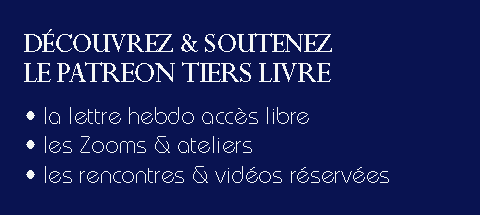
intervention en anglais au colloque "thinking & writing in digital age", Berkeley, 23 oct 2013
– la version française du texte already beyond the e-book age
– english translation by Hannah Stell (NY) - eventual mistakes due to my own reworkings, sorry
– many thanks to Laurence Marie, Gilles Delcourt & Stéphane Ré, Tim Hampton & others

François Bon, a digitial biography (and now ?)
1982
I’m 29 years old, I publish my first book. I run across Beckett or Robbe-Grillet in the stairwell of the Editions de Minuit. With my first royalties I buy myself a leather-bound edition of Flaubert in 16 books and my first refrigerator. Bookstores sell the book, newspapers write articles : everything will surely go on like this forever.
1983
However, I’m already on my 4th typewriter : a two-toned ribbon and manual return one, to a ribbon one, then electric keys, to an IBM type ball, then to a “daisy wheel” and the appearance of a new capability : I can go back over the last 15 characters and correct them before the letters strike. I still have carbon paper to make “a copy”, and scissors and tape to format the text.
1988
I receive my first computer, an Atari 1040. Among my friends, Daeninckx, Bergounioux and Novarina have the little Mac Classic that looks like a cube, Pierre Michon has an Amstrad. I have a pin dot matrix printer with a roll of perforated paper. There’s no hard disc, first you have to load the disc system, then the word processing disc, and then the disc works. Having two copies on the disc itself.
1990
We agree on the new manuscript with Jerome Lindon, from Editions de Minuit. I ask him if he wants the disc, he answers me : “I hate MacIntosh literature.” Then, 2 days later, he calls me back : “Send me the disc anyway.” Since my first book, I haven’t done anything else : every two years a new publication, my first requests to appear as a writer (on the radio, for example), grants (the villa Medici, or at Berlin DAAD) : someone who publishes a book doesn’t benefit from any privileged social status, but author’s royalties do have the benefit of a tax relief, and we raise our children close to the sea. When a book appears in the month of September, it’s printed in July, in August it’s sent to the critics at their vacation addresses. The big sellers get up to 30 or 40,000 copies (the Medici prize for the beautiful Cherokee by Jean Echenoz, a Goncourt gets up to 100,000 (Jean Rouaud) : we live on little, but we live it all. In Sweden, Denmark, Germany, the Netherlands, I’m translated : we exchange the rights, which are negotiated for between 300 and 500 dollars : so in all these countries now I have friends. Now, the same book everywhere, everywhere. No longer ours.
1992
I live in Montpellier, south of France. When, for a film or a play project, I work with a Parisian friend, I connect my computer to the phone jack via a 5600 baud modem, and the file passes from my computer to his. Twenty years earlier exactly, in engineering school, I learned the Fortran language of perforated cards. A little earlier, in 1970, we received our first Hewlett-Packard calculators, but on exams only the “slide-rule” was permitted and required.
1994
It’s the age of the CD-ROM : I acquire the Littré (our old and best French language dictionary), an atlas, and an encyclopedia, then the complete works of Balzac. The screen of my PowerBook 145 is still in black and white, but it’s portable, and can last at least an hour on the battery. The hard disc is 45 Mb, it’s so huge that I called it “Ocean” (now I no longer give names to my hard discs, and my MacAir doesn’t even have a hard disc). Above all, it’s as big as my two hands, I use it like a notebook.

1996
I arrive in Tours, where I still live. In Le Monde I read an article explaining that on the Internet you can download Baudelaire’s Fleurs du Mal. I have a 13,200 baud fax modem. I make a CompuServe account, then am sent to the university in Aix-en-Provence to download the Netscape 1.0 browser, which takes a good hour. So I enter the address given by Le Monde, and maybe a minute later I open the file in my Word word processor. As thanks, I send a letter by post to the University of Geneva, department of mineralogy, which hosts this first database of texts, and I offer them, also by post, facsimiles of first editions of Rabelais that I’ve re-transcribed on the computer over the previous two years. And so I discover the collaborative principal of the World Wide Web. I hand copied the first edition of Une saison en Enfer, then Illuminations by Rimbaud, d’Alcools by Apollinaire, and while in 1998, after purchasing a scanner, I finished my Lautréamont, there are three of us, one in Montreal, on in Brazil, and I in France, who offer the html version at the same time. The french national library, BNF, doesn’t have a website yet, but I understand that an era is closing. One of the first businesses to offer a large digital library, Acamedia, went bankrupt (who would have been interested ?), I now have on my computer a good thousand digital copies of titles.
1998
I put the texts I ask my writer friends for online, while explaining the importance of an Internet presence to them. I take on a new role : the one who takes care of their Internet presence in their place. This site is always running, it’s called remue.net, and I’ll separate my personal site from it a bit later : I’ll need several years to understand that “acting in the place of another” isn’t the solution. The literary Internet is still meager, but there’s the appearance of a couple of online journals. I love webcams : I follow five or six, around the world, they don’t show much (a gas station in Iceland, a port in Scotland), but the relation with what’s not accessible to us in the world ceases to presume the preceding catastrophe.
2000
I’m finishing a 10 years work about the reception of rock in Europe, and the constitution of culture in the media age, already a transition story : a 1000 pages book, called : « Rolling Stones a biography ». I have purchased over the years a bunch of bootlegged CDs, kilos of books and old magazines in London Helter Skelter or the fabulous World Trade Center bookstore in New York, every resource is a conquest, which necessitates a trip, contacts or exchange, and finally a transaction. In 2006 I publish the following, the ‘70s version of this essay, called « Led Zeppelin, a portrait » : the smallest detail was discussed on forums, and if we still exchange films or pirated books, the whole archives come through the Internet – particularly a japanese guy who spent years to photography each location, homes, studios, venues, where the Zeppelin have been, and put them on line, or another one who provides every flyer, concert tickets or posters. Writing could avoid producing a representation of the world inside the novel itself : the world is beginning to provide himself, anytime, everywhere, his own representation. How to avoid it interferes deeply on how to build a story ? Something happened. By the way, the millennial bug didn’t happen.
2002
Lots of dreams, for years now, on how can fiber optics be taken advantage of for fast Internet ? Not arrived yet to my place. Electrical outlets ? More realistic. But here it’s proposed to us to use the old copper telephone wires, what an idea…ADSL (Asymmetric Digital Subscriber Line) the information that you send over it goes less quickly than what you receive. But in one fell swoop, no more need to buy a printed newspaper, we flip through it with the same speed on our screens. And on the Bibliotheque nationale’s website, I can flip through author’s first drafts in picture mode. And the premature end of CD Roms : who could’ve guessed ?
2005
My site is made up of close to 600 individual html pages (about 7 000 entries today : my full life and wok ?). The appearance of blogspot, as the first easily configurable CMS for non-computer scientists. From then on, my site is a “database”. For the moment, I continue to give my manuscripts to my editor : on the site, the construction of the book, the author’s journal, writing workshops. And, when the book is released, the articles and interviews concerning the book. The Internet as cultural media : strangely, it’s still the dominant model for American authors. A blog uses whichever platform, mostly on Blogspot platform, acquired these days by Google, to provide direct access in place of buying the book. In 2006, I want to give myself a constraint that permits me fantasy or science-fiction writing : for a year, every day I publish a brief story directly issued from my daily experiences, or a dream, or in the form of micro-fiction. I connect it to photographs, I insert hypertext (hallways whose doors open to other texts), links, and sound. The site is called Tumulte, at the end of one year I publish what I consider to be a global fiction, fiction being also what protects in the daily and intimate exhibition on your website. This fragmentation according to the daily time spent writing is not new in literature, from Montaigne to Stendhal, or Kafka’s Journal and lots of others, or the “micro-fiction” by Robert Walser published daily in the Berlin newspapers. But, when I publish my book with Fayard, the articles all say “Bon publishes his blog”. I understand at that moment that I’ve taken a new step : the publication on the site, with its underground galleries, indexes, is a way of reading that’s superior to that of the printed book. Only, we are there in it (we are always there in it) : what took me from author to writer is the symbolic understanding of this role—who would grant that to writing on the web ?
2008
For almost ten years, regular but fruitless conversations with my editors and my friends who work in publishing houses, bookstores or libraries about how to use the web. And so I’m overseeing a collection of contemporary literature at Seuil : I often receive short texts, texts from young authors, for whom the site permanently steps in for the manuscript, transforming them into a book would be like trying to force a foot into a too-small shoe. And so I set off on my own : I create a digital publishing house, publie.net. In the beginning, only in order to make available online, in PDF format, the texts that my writer friends and I kept on our hard discs. In New York, I buy my first “liseuse” (we keep it in the feminine form, this French word for e-reader), a Sony then a Kindle : if reading habits are being established here, with specific bookstores, why not create a workspace for contemporary literature ? Besides, our websites suffocate under their own limits : how can you read a 300-page text in the division of a site, how can you bring it with you to the beach or on the train ? We will discover the ePub format like a new frontier : a closing, a little box shuts, with bits of text in it, the css files (cascading style sheets) that give them a face, the possibility of including images and sounds (we launch a digital experimental review, D’ici La), and above all, the metadata files, which will allow for a hazy request coming from a general platform (Amazon or iTunes) or directly on a browser, to bring forth that very text as a suggestion. The experience will last 5 years and will be very beautiful, we had underestimated : 1, the distrust and the passivity of the traditional book trade, literary press included, 2, the passivity of the university, so completely concerned with digital technology, science, social sciences, but stopping at Humanities.
2010
For at least 3 months, I keep going over these themes. A limited number of things seemed to me to be progressively detaching :
– this “closing” of distinct elements, text, graphic mask, metadata, it also makes up the printed book in that it goes from the editor to the printer, and it’s also present in the smallest word processing file. A student who starts his studies in mathematics or geography will right away learn to master these digital tools that will be the vocabulary of his thinking. In France, a great philosopher, Gilbert Simondon, who influenced from Deleuze to Stiegler, theorized this necessity for the thought to not be separated from the technical object. What do we do, in the Humanities departments, or in training on the craft of the Book, to implant this “digital culture” ?
– for an immense majority of authors who were my friends in the time of paper publishing, even today the Internet is a media, a promotion tooli : you type your name into Google, and you see your Wikipedia page appear, newspaper articles about you, books to be sold (according to the way of Amazon, or in France our local Fnac, or whichever independent store has handed over its ransom to Google), and press articles. This is called “digital identity”. Very early on, to create my own understanding of digital identity I used the metaphor of the artist’s workspace (« l’atelier du peintre ») you enter when you want, you can watch him work, he goes “to the subject”, as Cezanne said, some canvases are turned to face the wall, in the workspace there are even the books he’s reading, the curosities or objects or pictures he has bought) or the workspace of an instrument maker friend, dead now : in the little window through which his workspace looks out over the street, he places an old instrument to be repaired, the mold of an instrument being made, and we see he himself from the street making his bow or preparing his varnish. This assumes buying his own domain name, to assure the ownership of his database (Google will treat the data of a Wordpress website that you host under the form myname[dot]com, or that Wordpress hosts under the form myname[dot]wordpress[dot]com differently). Recently, the site of a friend who is a celebrated and well-respected author, didn’t appear until very far down in the Google searches : his own name never came up on the pages of his site, because it was his…Questions obviously become even more decisive when you express yourself in a language like the french language, slowly falling to the status of the regional language : the welcome message in the United planes, yesterday morning, was given in six languages, but no french anymore – and given that the totality of the actors on the web, research, bookstore, machines, software, and even domain name authority, are yours, you Americans.
– and that we have an amazing opportunity : compared to the political, aesthetic, and social changes, the changes in writing can be counted on one hand. The invention of writing, which is far from applying to all languages. The extraordinary story of the clay tablet, when the simplification of the tool (the bevel-cut tip of a reed), while quickening the speed of writing, it sparked the change from iconic writing to syllabic writing, the techniques for authenticating a text (a layer of raw clay covering the layer of baked clay with the same text), the invention of the page (the first clay tablets were molded by hand, writing wraps around it), reproducibility (crude tablets were kept in a water pail to be used again), the primacy of reproducing images (the seal, the cards used for divination made from the livers of animals). Then the spread of the Egyptian scroll through the Mediterranean (the biography of Ramses II, 35 meters long, accompanied him in his tomb : no other reader), the cementing of oral corpuses (Homer), and the word “book” which referred to the parts of a roman long text, cut in separated rolls, the first metadata (author, title, book) on the plug that seals their case. As for the tablet, the use in private correspondence interfered with official, ritual, or literary usage : a Roman read his scroll horizontally, but his private correspondence is written vertically, on the longitudinal falls of scrolls for books. But legal texts are also written on vertical scrolls, to prevent cut off or added pages. Then the invention of Codex, and the words that came along with it : the “copies”, separated notebooks of a manuscript copied identically, so that several copyists can work simultaneously, but always from the single copy closest to the original. Finally, not Guttenberg’s printing press, but how Aldo Manuccio, in Venice, taking from the Koreans painting on silk robes, has the idea of a rod on which movable characters are attached : the author could be burned, but from 1,000 printed copies, not larger than your pocket, the idea will still not be stopped. Finally the very complex story of how newspapers and serialization interfered with forms of literature. Five major changes : digital writing is the sixth. Each of this major moves has been irreversible, and global.
– for each of these changes, we get rid of precise chronometers : Balzac (the definitive pseudonym of Honoré Balssa), will have 3 successive names that correspond to 3 successive stages of forms for commercializing his writings, from « fascicule » for reading rooms, then to serial publishing, and monthly reviews, with each time a different way of telling a story. Baudelaire wrote a dazzling text about the drawer Constantin Guy, « Le peintre de la vie moderne », whose sketches done right on the field of battle in Crimea arrived at the daily newspapers in London in 9 or 11 days : there was real time access to historic turns (and add these 11 days to the speed of dissemination on 11.20.63 or on 09.11.01), but don’t forget Baudelaire’s terrible question : in this case, the image itself sufficed and no longer needed text. So what appeared is a decisive axiom : each of these 5 changes is accompanied by a very rich transitional period that we can grasp in itself. The turnaround, for universities of the Humanities, who never needed to consider the book as a historicized object, it is up to them to learn to work on the history of these transitions, up to them to have a chance to think about the current transition, which is clearly happening on a scale as strong and radical as those preceding it.
– finally, last axiom : the unpredictable—even at Berkeley, we’re talked to about the “future of books”, but the book is only one particular form of the written, and the written one particular form of literature (“language as reflection” Maurice Blanchot stated). The question that is presented to us, in a time of transition, is that it is up to us to act in a responsible manner in the immediate present, to teach, to pass on, to carry with us, in the crossing of the ford, the living words we have inherited (the beautiful sentence by Rabelais : “I build only living stones—these are men”—these living stones are entrusted to us), even though all the present transformations appear suddenly and erratically, and only reveal themselves to us retrospectively. Word processing doesn’t change. Is it a regression for dense reading ? A surgeon who operates from a distance, from his Mac, on a brain tumor, has on his screen, like the pilot of a United Boeing, a dozen different opened windows. When we read a printed book, with our notebook of comments set on the table and the day’s newspaper to the side, or even at a café and the friendly voices just nearby, is reading not already, and always has been, a social act ? Multitasking has taken part in these unpredictable micro-revolutions. In 2010 the iPad appeared : we take the web with us. I remember having discovered in April 2010, in Boston, the first ads for the iPad : people in socks on their couch. How far have we come ? The little “READER” icon on iOS, or the little pair of green glasses on the Kindle Fire, indicate that the browser rewrites the web page, and gives it to us with ergonomics (up to us to define the parameters) exactly identical to that of the digital book (eBook). With the button “Send to Kindle” we read a streaming text with the same ergonomics as began with the epub.

2013
Is there stabilization on the horizon ? Surely not, or not yet. We can even confirm that the season of great movement hasn’t started. Here, in the US, the distribution of e-books is put forth as a visual extension of the printed book, it’s even physically visible in Barnes & Noble bookstores, with a space set aside for the Nook by the entrance. But appropriating the web as a vector for literature has remained in the realm of magazines and reviews, which are a fantastic workshop on the web, but they don’t take advantage of the economic model to the same level as the traditional method, and even less than the great giants you Americans have so kindly offered to the world, Apple, Amazon, Google, Microsoft and a bunch of few others, Adobe, Yahoo, CloudFlare as the last one... The rarity of brick and mortar libraries, or in any case the degree to which they are becoming rare, has probably delayed this change, by making the web a vector for acquiring objects, in the way that they don’t care that I read on my Kindle. The stratification by genre, novel, romance, fantasy, poetry, without talking about the writer’s aid line, is found even more reinforced, even while American literature was one of the first to develop forms like the short story or non-fiction that give literature of creation an appropriation of the world outside of all hierarchies, up to the writer to create the most direct rapport between language and still unwritten reality. This worked for Thoreau or Dos Passos as for Ginsberg’s Fall of America, or contemporaries like Nicholson Baker or David Foster Wallace and others. In Europe, we had to learn a little earlier that the web would be our first terrain of writing as dissemination, and the location even (spatiality or temporality as well as medium) of what we demand to writing. This is what I understand in the expression that I’ve chosen to make my title : « already beyond the e-book age ».
writing changes in the end
The author’s notebook doesn’t change : there are always sketches, cut papers, documentation. What changes is that we can integrate them anywhere, as distinct levels, in the object we separate ourselves from, so that it belongs to its reader.
The author’s library doesn’t change. Faulkner venerated Tolstoy and hated Dostoyevsky because of his disorder, but while having a much worse one, Proust was bored by Tolstoy and venerated Dostoyevsky, but wrote “salons” on the same formal principal as Tolstoy, our task of teaching doesn’t change, even if the American authors rise to the highest level in contemporary literature without meditating on the ages of books, as we in Europe are obliged to do, of we want to survive in a world that doesn’t require us any more.
But we know that, in all times, the dense rapport with the texts has surged from the same place, and with the same writing medium, that there where private use is established—from reading aloud for a few listeners to Rabelais’ time, and that is the dramaturge’s key in his recitals, from the epistolary novel whose golden hour in XVIIe century (Mme de Sévigné) was that of a unified and quick postal service, partially freed from censorship, on a countrywide level. Our students’ use, to keep themselves informed, read, write, listen, in the same movement : smartphone, laptop. So yes, with literature, and what it brings of subversion and transgression, like the beat poets emerged vocally on campuses because the musical space had created a place for them that the printed world had refused, work for the laptop. Fetishizing a unified technical object ? It keeps progressively disappearing : five years ago today, his colleagues made fun of a young Indian MIT student, Pranav Mistry, who walked around with a giant camera set on his head, strapped on a worker hard hat, and a “video projector” data show on his chest, his hand as a screen, before everything could be miniaturized, and here we have today Google Glasses—we must permanently negotiate an object with a millennial history, long time evolving, writing, in the context of a story of radically moving mediums, and first of all mercantile.
Look at word processing : what difference is there between your first Word software (for me, 1993, almost twenty years ago) and today’s version ? But do you still use Word ? Your mail management software makes up its own database. Most likely, to find a file sent by a student, you archive the e-mail with its attachment, this will be faster and easier to find. There’s little, for every text we write, we open a new file, specific to this text, and archive some files from hundreds. A book, on the contrary, on our computer, is no longer a single file, but a vast dossier made up of separated research, different versions of work, and certainly an area of archiving organized links (tools like Zotero) and messengers. Software appears (I’m thinking of UlyssesIII) that doesn’t create a separate file for a text, but allows you to write as you intend into a unique database, that you can archive at the same time on your computer and outside of your computer, and present characteristics like being able to tie in at any moment of the book, or the article, or the notebook, these links, images, e-mails, meetings. Another characteristic : we only write by way of the comfort of a screen (on the iPad, this software is called Daedalus), which you manage to your liking, the function of exporting the text is specific to the way in which the text is going to circulate, and how it will be reproduced and accessible for reading : on a website, via an electronic book, via a PDF, or a separated text file. How can such a revolution, still so new (who, in the room, has swayed between a Pages, or Word, or Open type of word processing to a “markdown” software—and equally ask a mathematician friend who among them doesn’t use LaTeX ? Not a critique, but a question : the code that stays invisible to us, because stable, in our 300 year long use of typography, from manuscript writing since well before that, at what moment must it become, in the name of our liberty in language, an element of culture to teach or transmit ?
So what am I then the author of, if not a database, which henceforth overrides the books that I commercialize through contracts with editors, but are all accessible on my personnel website ? So the publishing contract represents a specific mode of access, to the side of the main arborescence. My archives don’t differ (I mean : for those who make them) essentially from the collections of notebooks, rough copies, correspondence left by pre-internet authors in an archival institute or a library. The problems of perenniality are specific (the Bibliotheque nationale has given my site an ISSN code, exactly like a book, and in theory, regular collection). But if I stop paying my hosting service provider, and everything flies away. The idea of publication, the rapport between daily writing and the finished work are the same : but, we pushing web publication, the temporality of publication, the notion of a community of readers, become official tools for the time being in the very composition of the story, and how it acts. What acts is not the partially finalized figure of a particular point in my work, what was a book coming after another book, but, permanently, the web site itself, where I’m the artisan of not only the text but the ergonomics, the navigation, the coding—points that I accept as integral functions in my work. When we think of the work of Baudelaire, or Franz Kafka, we don’t think of the sum of their books, but first of this set of archives that entered the public space, in a partial or total way, immediately or progressively, long after the author’s disappearance. Perhaps, in a much more humble and dynamic understanding of the word oeuvre, we could find a stable foundation for what is starting off, that books do not allow us.
That’s where I am. In 25 years of the computer, and 30 years in the world of professional publishing, passed from a stable world to an unstable one. The question of technology is completely secondary to that of the culture. The unpredictability of our moment in transition is chaotic, dangerous, because it eliminates the established positions, to begin with the status of the « écrivain » (in french, more than simply « writer »), a word invented in the 17th century, and to which only the 19th century has conferred its symbolic dimension. But this present itself is also, inextricably, a story, which we can and must treat as such, under the condition of reaching it by way of the stories of the preceding transitions. Which of us would not have liked to write at the time of the invention of the printing press, like Rabelais, which of us would not have liked to write at the time of the appearance of serials and newspapers, like Dickens or Dumas, or the appearance of locomotives, like Flaubert and Zola, or electricity and the telephone, like Proust ? Please take it as extreme and real luck to be seized ourselves by the changes now and blindly happening, and that our writing, captured by new forms of reading and distribution, obliges us to jump : « au fond de l’inconnu, pour trouver du nouveau », has written Baudelaire.

diffusion sous licence Creative Commons CC-BY-SA
1ère mise en ligne et dernière modification le 23 octobre 2013
merci aux 3935 visiteurs qui ont consacré 1 minute au moins à cette page

